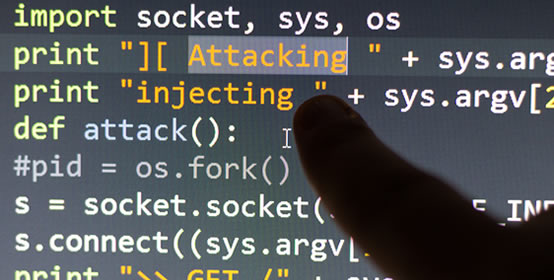
Once sci-fi had you looking forward to the day when you could run your household by remote control, or get answers from a computer system without getting out of your chair. That time has finally arrived, but so have cybercriminals. Hackers have found flaws in the connectivity between smart devices and the IoT (Internet of Things). There are so many products out there that every time a security issue is fixed, hackers find a new way in.
People are installing more smart devices into their homes - TVs, routers, thermostats, alarm systems, even washing machines. But these smart products are almost never regarded in terms of a vulnerable network. Hackers could conceivably break into each one, or compromise all of them.
Nothing is safe. Geolocation mobile apps that let parents track their kids are also subject to hacking. But the IoT is an even more tempting target because there's a good chance you'll never know you were hacked until the damage is done. These devices are constantly communicating with manufacturer websites over unsecured channels, and no one is monitoring the dialogue. Most devices are connected with your cell phone. Wi-Fi transmissions can be captured, recorded, and put to use.
Hackers can identify your IP address, and with it your location, and every smart device on your home network. When they know you're not at home, hackers have the capability to compromise your security system and send in a gang of thieves with an itemized list.
You can add an increasingly greater variety of smart devices to a home network. Imagine a hacker taking control of your thermostat, your door locks, surveillance cameras, lights, oven, or hot water heater. Your house - your life - is no longer your own. Even when there's nothing more sinister at work than a malicious prank, your family could be devastated.
In the movies and TV, hackers have always been depicted as super-smart people who can sit down at a keyboard and break into the most complex systems after half a minute of furious typing. And just like that, they can empty bank accounts, shut down entire buildings, or download government secrets.
When the internet was just beginning to expand, and most people were clueless about the workings of networks, websites, or programming, every new computer virus seemed like evil genius at work. Anything was possible and we were all at risk.
Certainly, there are a few brilliant hackers out there coming up with some ingenious code for infiltrating your hard drive or you and your friends' smartphones. In hacker circles, tips, tricks, and malware are traded like playing cards. Hostile foreign governments are training and funding entire IT departments devoted to hacking.
Yet, many people still seem apathetic to the risks. It's more like the idea of getting struck by lightning - the odds are slim enough so that you don't even worry about it. Not until it happens to you or someone you know. At times, harsh lessons are the best lessons.
Too often, security isn't even a consideration. For instance an expert at a security conference in Las Vegas revealed that one “smart” electric meter was almost universally installed with a default password of 1234. Many homeowners weren't aware of the need to change it, giving hackers access to their home electrical system.
The vast majority of successful hacking efforts work because people make it easy. Your home devices should be protected just as well as your computers at work. Router firewalls, strong passwords, account monitoring, and other measures help. However, you should be looking for smart devices that have plenty of security capabilities already built in - and using all of them.
It's amazing convenient, and even empowering, to start the dishes or answer you doorbell over your smartphone, but cybercriminals are even more elated. The potential for hacking into databases or computers was always there, but now that includes the ubiquitous smartphone and every Wi-Fi device in your home. The next “worm” could allow hackers to film your children, hijack your TV and internet, or shut off the power over an entire neighborhood.
As manufacturers start promoting smart devices they need to also develop means to protect them, and you. Demand for better security is already growing. Hopefully, it will be in place before many more people are victimized.